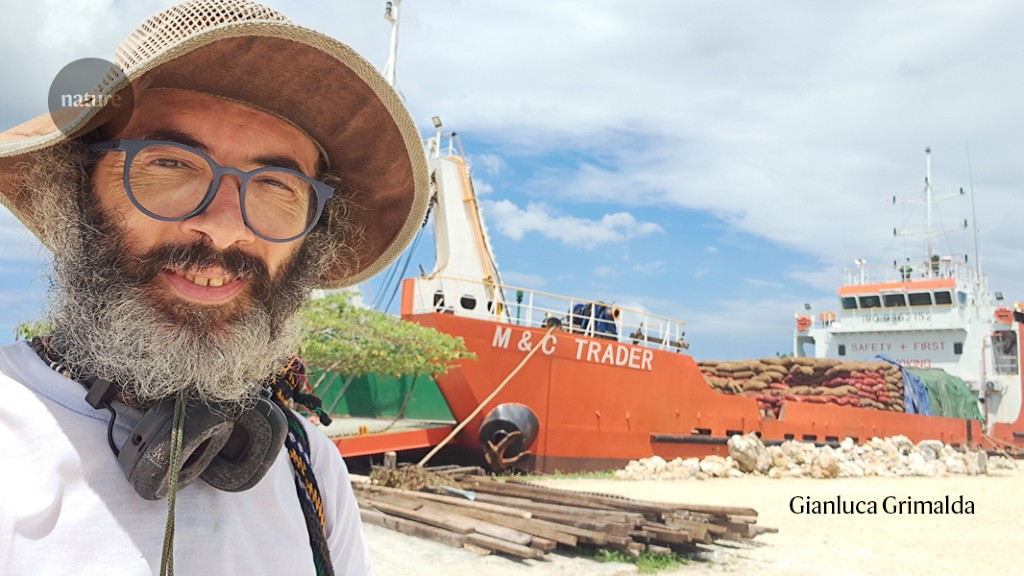Why a climate researcher pushed the limits of low-carbon travel — and his employer’s patience

A refusal to fly to Papua New Guinea for fieldwork took Gianluca Grimalda the long way across 22,000 kilometres and 12 countries
Gianluca Grimalda spent seven months in Papua New Guinea this year, but experienced plenty of adventures before he even reached the islands. He took an extraordinarily circuitous route as part of a fieldwork trip to Bougainville, an autonomous region of the country. Grimalda, who studies the social impacts of climate change, visited 30 villages in Bougainville to study the effects of climate disasters and natural hazards on social cohesion in small-scale traditional societies.
Mindful of his carbon footprint, Grimalda travelled mainly by low-emission methods to reach Bougainville. On 9 February, he left Germany, where he worked at the Kiel Institute for the World Economy (IfW Kiel), an economic research organization and think tank, arriving in Papua New Guinea 35 days later. This 22,000-kilometre trip took him through 12 countries in 22 legs, moving south and east through Europe, unexpectedly crossing the border between Iran and Pakistan in a police convoy and passing through India, Thailand, Malaysia and Singapore (see ‘By land and sea’). The whole journey ended up costing him a little more than if he had relied on flights, and he couch-surfed along the way to save money.

By Grimalda’s calculations, his outward travel saved about two tonnes of carbon dioxide emissions compared with flying. He did take two flights: one from Kolkata in India to Bangkok, and another from Singapore to Buka in Papua New Guinea. But most of his travel used a combination of trains, ferries and buses.
Grimalda is determined to reduce his emissions even further on the return trip, by cutting out aeroplanes altogether. The homeward trip will take even longer — between 40 and 50 days, he estimates, following a route that, unlike his outbound journey, will take him north into China if he can’t get a visa for Myanmar. He estimates that his modes of transport will nevertheless end up producing between 400 and 500 kilograms of carbon dioxide, but that’s still one-tenth of the amount to fly all the way, he says.
He left Bougainville on 16 October for the town of Rabaul on New Britain, another Papua New Guinean island, travelling by cargo ship. His passage was free, and he spent some of the return trip working on his research and fending off insects.
But Grimalda thinks his travel brought him into conflict with his employer, which withdrew its support and terminated his contract on 11 October, following his delayed return to Kiel. He had originally intended to be back on 10 September, but his fieldwork took longer than planned, he says. His employer afforded him five weeks to travel out and seven weeks to return, and therefore expected him back by 2 October. But with the delay, this would have involved him flying long distances, which he couldn’t abide. He acknowledges that it’s a big delay and says he offered to use unpaid leave for his return journey. Nature asked IfW Kiel to confirm that Grimalda’s contract had been terminated and, if so, when, but the organization declined to comment.
Grimalda now anticipates returning later this month or in December. The document terminating his contract, which was sent to his postal addresses in both Germany and Papua New Guinea, does not specify the reason.
Consequences of low-carbon travel
Grimalda’s commitment to slow travel has had other career repercussions. He doesn’t fly to conferences, and so his opportunities for networking have been constrained. “My network is probably smaller,” he muses.
Other climate researchers support Grimalda’s stance. Jesse Schrage, a social scientist and doctoral fellow at the University of Bergen’s Centre for Climate and Energy Transformation in Norway, is part of the Transflight research project investigating air travel and carbon lock-in (practices that are incompatible with a low-carbon future). Research institutions “are locked into high-carbon travel patterns and academics remain high emitters”, he says.
“By refusing to fly, Gianluca Grimalda is showing leadership at a moment when deep and rapid changes are required,” Schrage says. “Such behaviour should be encouraged, and not reprimanded.”
A spokesperson for IfW Kiel, which declined to comment on specific staff circumstances, said: “When travelling on business, the institute supports its employees in travelling in a climate-friendly manner. We are committed to do without air travel in Germany and in other EU countries as far as we can.”
Challenging travel norms
“With my action I tried to push the boundaries, a little bit, of what is considered normal and abnormal. So of course, many people can say that it’s crazy what I’ve done,” in jeopardizing his job by refusing to fly long-haul, Grimalda says.
Recalling his time in Bougainville, he says: “Climate change was mentioned more or less by everybody as a major factor for a decrease in well-being.” This was linked to smaller harvests, for instance. The coastal communities had also been relocated to areas farther inland, because of the drastic sea-level rise around their original homes.
One of the island villages where Grimalda conducted research and presented information on climate change was Pokpok. Moses Miramira, a chair of the Pokpok administrative ward and a chief’s son, explains that sea-level rise there is “getting worse every year”.
He adds: “It’s the Industrial Revolution which is the cause of the sea rise in low-lying islands in the Pacific. I think those rich countries realize this.”
Meanwhile, Grimalda, who has started applying for other positions, stands by his actions. “In this time in which we are really very close, and maybe have even exceeded the thresholds associated with the collapse of many ecosystems, it’s crazy not to act.”
doi: https://doi.org/10.1038/d41586-023-03496-3
This story originally appeared on: Nature - Author:Christine Ro


















